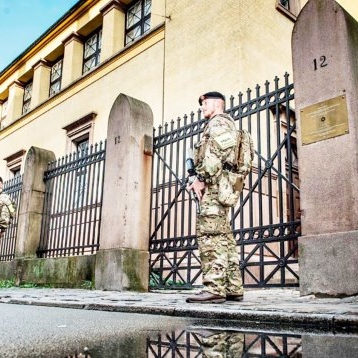click to dowload our latest edition
CLICK HERE TO SUBSCRIBE TO OUR NEWSLETTER


Published
5 years agoon
By
adminJULIE LEIBOWITZ
In June 2018, the Danish Parliament announced that Denmark was considering becoming the first country to ban nonmedical circumcision of infant boys. This announcement followed a citizens’ petition by the group Intact Denmark that called for a minimum age of 18 for circumcision to protect children’s rights. It also states that parents who had their children circumcised outside Denmark should be exposed to legal action in Denmark.
The petition reached the threshold of 50 000 signatories, following which it becomes imperative for it to be discussed in Parliament, possibly by November.
Though the bill is not expected to become law because ruling parties are opposed to it, Danish teenager Hannah Bentow, told the Jerusalem Post in June that the debate “makes me feel like I don’t belong, and like Denmark doesn’t want me to belong, either”.
“This [debate on circumcision] is sucking the marrow out of wanting to be Jewish,” Mette Bentow, her mother, told the Post in the same article, titled, “Denmark considering a ban on circumcision. Will the Jews stay?”
Denmark has an unusual “righteous among the nations” status, which recognises the collective effort by its citizens to evacuate the country’s minority Jewish population to safety in neutral Sweden during World War II.
Historians have highlighted the fact that at the time, Danish Jews were almost entirely assimilated into Danish culture, making them indistinguishable from other Danes, and this partly accounts for their protection by fellow citizens.
The push for integration in Denmark is relevant today, as what is seen as xenophobic policies, with negative ramification for Jews, is apparently part of the country’s increasingly overt methods to assimilate foreigners into Danish culture.
Jews appear to be caught in the crossfire of Denmark’s reaction to Muslim extremism and separatism, made more acute by populist, right-wing political parties. Denmark currently has about 8 000 Jews and about 200 000 Muslims.
The circumcision debate was preceded by an announcement in March that the Danish government would pursue a new set of laws to deal with “parallel societies”, and abolish “ghettos”.
These policies to impose quotas on schools and other punitive measures are intended to compel non-Western immigrants to integrate into Danish society.
The policies, to be implemented in 2019, include graver punishments for crimes committed in Denmark’s poorest urban areas, a limit on public housing in these areas, lower benefits for people settling in government-defined ghettos, and compulsory 25-hour-a-week teaching in Danish values at government preschools for children in these areas, without which welfare can be rescinded.
Added to this is the recent passing by the Danish Parliament of Law 18, known as the radical Imam or hate-preacher law, which has criminalised certain types of statements from religious preachers.
“To many immigrants, the plans feel like a thinly veiled way of telling them that they are not welcome in Denmark,” said a recent article in Time magazine.
An article in the Spanish language daily, El Pais, says, “Denmark is used to immigration – 10% of people in the country have an immigrant background – and to Islam. But the feeling among people is that the arrival of new immigrants or refugees has taken root in the political class and the media as a threat to the country. And from there, it’s only a small step to discriminatory discourse.”
Aside from discriminatory laws, Denmark is said to have some of the most restrictive immigration policies in the European Union, having accepted nine times fewer refugees in 2015 than its neighbour, Sweden, which was ironically the refuge for European Jews so many years ago.
Denmark’s Chief Rabbi, Jair Melchior, points out that none of the new laws are aimed at Jews, although some are motivated by an anti-Muslim bias – which doesn’t make it any less of a serious concern.
He says the proposed ban on circumcision actually comes from the perspective of “extreme liberalism”, a desire to protect children’s rights, not an anti-Semitic nor an anti-Muslim bias. In fact, concern for the Jewish community is what is stopping political parties from voting it into law.
The Imam law, he points out, ended up hurting fringe churches, although it was aimed at Muslims.
“Denmark is one of the best countries to live in,” he says. “It’s safe, has a good economy, and there are few issues of concern. There is a small amount of extremism from both the radical right wing and Islamists, but anti-Semitic incidents, both physical and verbal, have actually gone down in the past three years.” (He was referring to the fatal attack on a Jewish shul security guard outside Copenhagen’s main synagogue in 2015.)
Pointing out that there are currently “no Jewish ghettos” in Denmark – the population is too small and dispersed – Rabbi Melchior says that we should fight against discriminatory laws because it is wrong to have laws prejudiced against certain groups, not just because they could have negative side effects for Jews.
